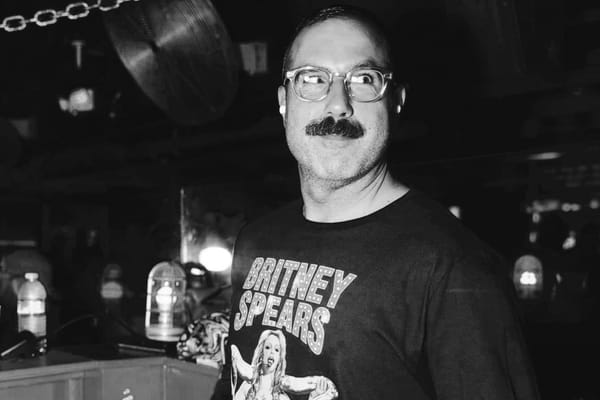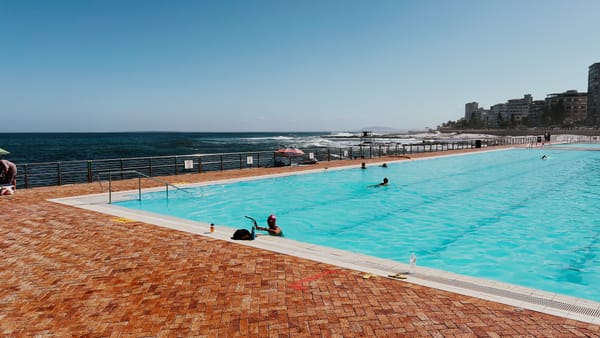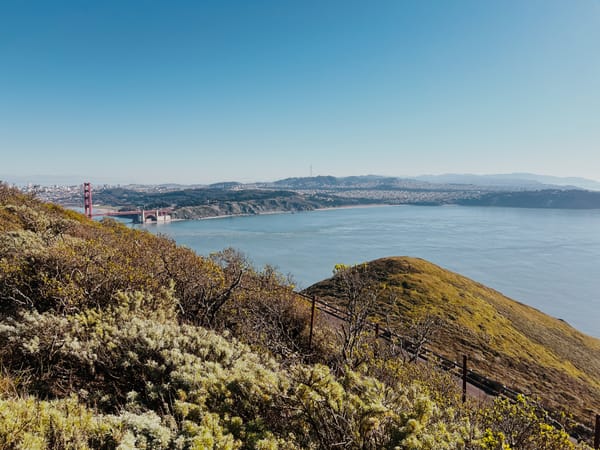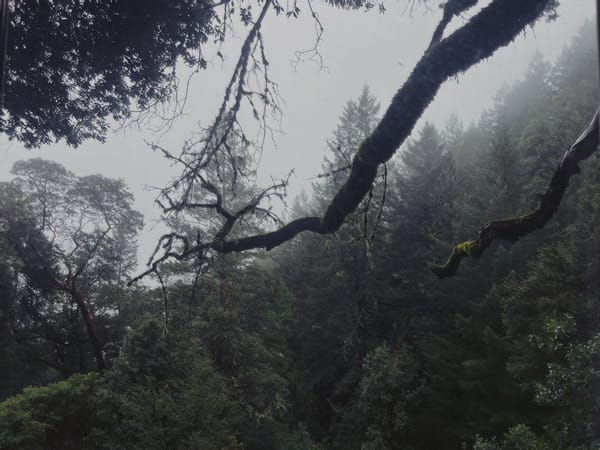“It makes me have zero regrets about not completing my PhD.”
An interview with Brendan McHugh about the collaborative effort to bring "The Butch Manual" back into print.
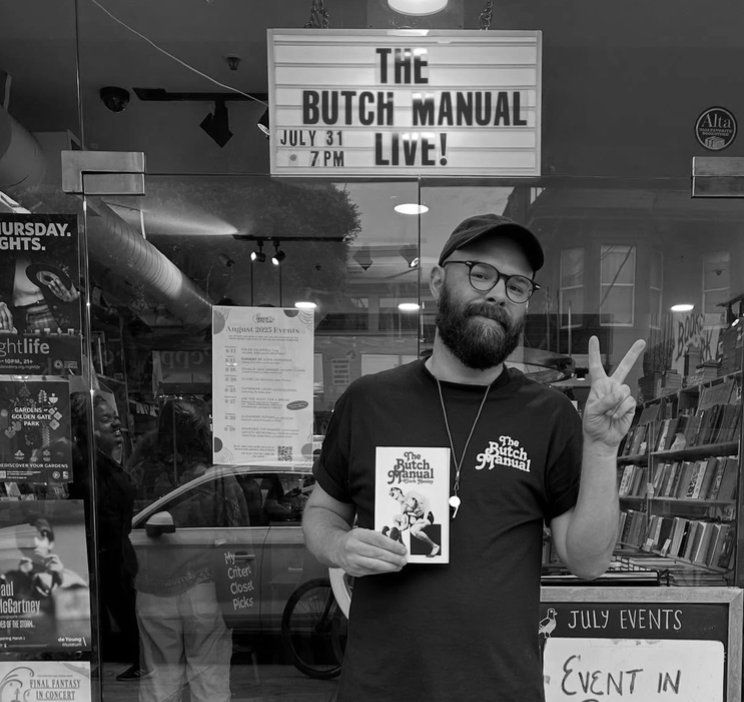
An interview with public historian and writer BRENDAN MCHUGH about the collaborative effort to bring The Butch Manual back into print over four decades after it was first published.
Penned by the late Clark Henley in the style of a women’s glossy, The Butch Manual is a hilariously witty and darkly satirical guide for gay men on how to appear more masc.
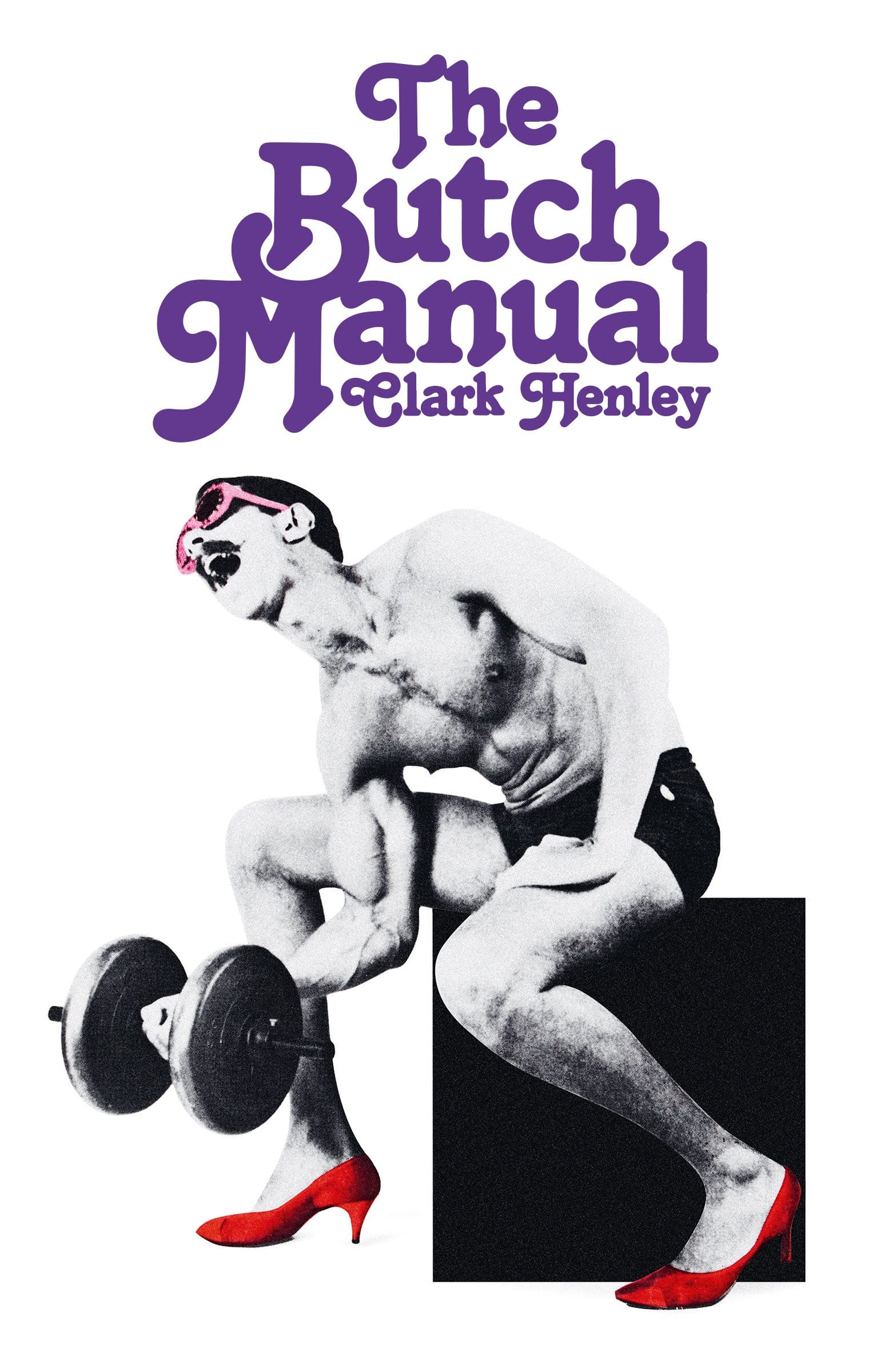
Xander Beattie: When/how did you first encounter The Butch Manual?
Brendan McHugh: I first encountered The Butch Manual through my early research on Clark. I first read his articles and small essays about living with AIDS in various AIDS organization's newsletters and publications started by People living with AIDS, specifically PWA/Voice. When I read his obituaries I always noticed that he had written a book called The Butch Manual. I could never afford a hard copy because they went for hundreds of dollars on eBay or Abe Books. I found a very illegal PDF of it, which many millennial fans of the book have told me was their first taste of Butch, too. I fell in love with it immediately. But, it was those first writings about Clark's experiences with AIDS that brought me to Butch.
XB: What inspired you to work towards getting it reprinted and shared with a contemporary audience?
BM: At the time I first read it, which was late 2021, I just knew it needed to be back in print. At the time I was balancing a larger writing project about SF AIDS care work and wasn't sure how I would manage that. I first reached out to his family, after some extensive sleuthing, asking to know more about Clark and what else he may have written that I didn't have access to. I really wanted to find a way to bring it back into print.
The republication of The Faggots and Their Friends Between Revolutions was also a big sign to me that there was still an audience for Butch, that readers would eat up Clark's wit and the artful comedic genius that shaped the book. I made contact with the family and they gave me a copy of his journals from the late 1970s to the time of his death. In the midst of reading them, because those journals are also brilliant, funny, and moving, I just knew it had to be done. I wasn't sure how with the time I had.
Shortly after this I lost my home to a fire and was basically unhoused for a month while I figured out a place to live. The journals were safe, by the way. Maybe a week into that experience I got this email from John Dempsey. He was a huge fan of Butch and had been throwing these amazing Butch Parties at his home on Fire Island for years. He clearly cared about Butch and wanted to know more about Clark. An article that I wrote where I discuss some of Clark's writings about AIDS was the first thing he had come across that shed more light on this rather mysterious figure. We immediately hopped on a Zoom together. It was an emotional homecoming. Tears on tears. We decided that we would be the team to bring this book back into print.
While we both had a list of potential places we wanted to pitch it to, Dark Entries was the one we both (independent of one another) had really wanted to go with. John came out to San Francisco and we met with the family, saw more of Clark's archives that had been living in their respective homes. They granted us support and permission. John and I attended a lunch together (with gay icon and legend Peter Berlin in attendance) and saw that Dark Entries was hosting its One Year Storefront anniversary. We went to the party and John approached Josh Cheon about our project. We stayed in communication and Dark Entries became the home for this reprint. It was a holy trinity – and it helped that all of our aesthetic tastes and passion for the queer past dovetailed so splendidly.
XB: What's been the most challenging part of the publishing process?
BM: The most challenging process, or time consuming, was obtaining the rights of Butch from Penguin Random House. It was a hunt and John was so on it with them to get it figured out. I am very grateful for that. At first they couldn't find any paperwork so they were going to just draw up paperwork to revert the rights to Clark's family. As that was happening, they then found the original contract of when Plume Books obtained the rights from Seahorse Press. Fortunately John and I had been in touch with Clark's editor at Seahorse Press, the late Felice Picano, so getting the rights reverted back to Felice, who then reverted the rights back to the family was smooth sailing. But that waiting and back forth was the most time consuming and even irritating part of the process.
What was also difficult was that the folks from Penguin and Plume did not have copies of the original photos from the book. They could not find them, though there is a chance they live somewhere in the hidden places of Penguin. This made the process of reprinting Butch through Dark Entries difficult, because we all wanted high quality photos in the book (they are half the fun of it as a reading experience). John and I did not have much part with that, but I know that Josh and the group of people he brought together to reproduce the book went to painstaking lengths to make them look as sharp as possible. That was also very time consuming. But, the book looks amazing and the photos are sharper than they are in the first edition. Clark would be very pleased with it.
Going through the proofs of the book to find spelling errors and layout issues was intense. The most rigorous experience I've had in terms of writing or working on a project. We were bringing together the best of both editions and that required close eyes to make sure the entire book was cohesive. I felt very challenged by this part as I had to read the book very differently and often felt like I wasn't finding enough things that needed to be fixed. But it was so worth it. It's a gorgeous book. The work that our layout editor, Eloise Shir-Juen Leigh, designer Julian Hamer, and our photo retoucher, Mike Hanson, did along with the editing eyes of Josh, John, and myself have produced a really special book.
XB: And the most fun?
BM: For me, seeing all the work that Eloise, Julian, and Mike did with this edition of the book was so exciting. The first time I saw the new pages of it I felt so emotional. Getting to know John and Josh through this process has also been fun.
Seeing the happiness it has brought Clark's family and friends has been a highlight of my life. And I have loved getting to put together readings of Butch with writers, poets, and performers who have so much fun and appreciation of Clark's work – the audience reactions have been a dream come true. I'm working on bringing it to other cities across California and the U.S. I also had John edit my foreword several times and that was a fantastic experience. He's one of my favorite editors I've worked with. John also hosted a Butch party in early August out in Fire Island and being a part of that (and going to Fire Island for the first time) was perhaps one of the most fun things I've gotten to take part in. It makes me have zero regrets about not completing my PhD.
XB: And what do you know now that you wished you'd known at the outset of working on this project?
Probably how much editing I would be doing on the proofs of the book and its design elements. But, I am glad I dove in as best I could. I can confidently say I have those skills now.
XB: In which ways do you think gay male culture has shifted since the book's first publication in 1982. And what similarities or through-lines do you think manifest today?
BM: This is kind of a typical historian response, but I am always surprised by what hasn't changed. When I read it, I was struck by the fact that the narrator of the book is insistent that Butch is the way to go, but tells you how to do it from this very queeny and cutting, camp voice. Debates about the validity and currency of certain kinds of masculinity amongst gay men seem unchanged. I think about the hookup apps and demands of MASC for MASC. And how without hesitation everyone who doesn't abide by that label mocked it, so easily. Clark himself said he failed at being butch, despite looking the part. Before I open my mouth I can be read as more masculine, and get misread as such on Scruff. So, in a way, this performance of butchness, of being masc, or having it be a question we grapple with as queer men has to do so much with patriarchy and misogyny. There is and is not a right way to be a masculine person in our culture generally. I think about how trans men and women are so viciously targeted, a lightning rod of fascist ire, and how we need to show up in a great volume. But, on the flipside, gay trans men are not always acknowledged as men by cis queers. Sometimes explicitly, sometimes in more coded ways. Which is fucked up. I could talk about the sexual aspect of all of this too, that is so shaped by AIDS and then by the rise of PrEP-which has radically shifted how sex is practiced and talked about amongst gay men, in my opinion. But I don't have that much space. But, in terms of performance and gender, much of what Clark thought was hilarious about Butch remains true.
XB: Any Butch tips from the Manual you've taken to personally applying yourself?!
BM: The portable contents of the Butch Day Pack is a must for anyone aspiring to Butchness. This advice was validating, too, because I saw the ways I was already butch. Particularly the requirement of several jockstraps that are yellowed, as well as a complete gym outfit in mismatched colors (among other things like aspirin, vaseline, lube). I also have a very butch medicine cabinet and fridge. Readers will have to get the book to understand exactly what I mean. Ha. I always fail at not talking with my hands though. Always, everyday. Even right now as I think out loud my answers.
XB: Youre a self-described Butch scholar. Tell us more about this / your work as Henley's biographer
This is funny for me because I was talking about this with John while out on Fire Island. We both said “Butch Scholars” to a group of guys who were at his house and then we both gave each other this look and went: “Actually, we are Butch SISTERS.” I added, “We say Butch scholars for The Publicity.” We cackled a fair bit about it all weekend.
I am first and foremost a queer historian, then writer, then poet only sometimes, and the foundation of my work rests in the history of the AIDS epidemic in the U.S. Clark's story came to me from my larger project telling the story of Shanti Project, an AIDS organization in San Francisco who provided free/volunteer based emotional support counseling services to people living with AIDS and their loved ones. They also started the first AIDS housing programs ever. Period. Among many other firsts that this undersung organization accomplished. Clark was a Shanti client for the last two years of his life, and also was familiar, pre-diagnosis, with the Shanti Foundation in LA (a similar organization but not the same by any affiliation). The groundwork I have done around Clark, plus this fast-paced rebirth of Butch, has shifted my focus a bit from that project and I am currently working through a project that is a biography, as his archival collection is extensive, as well as a collected works of Clark's other writing projects. Clark wanted to be a children's books author, and wrote and illustrated several. I am also interested in having those published, too. I am starting more conversations around what a collected works, potentially the journals, and the childrens books would look like in the next few years for me. Right now I'm riding the very fun wave of Butch's success as long as it lets me. But, I am in the process of bringing out Clark's larger life story to readers, his journey not just with his diagnosis, but his artistry, and his sobriety journey. Fortunately for me, Clark's writing is wonderful and there is so much more to share with readers everywhere.
XB: Your working life includes book-selling, and rumour has it you're an absolute FIEND when it comes to knowing about and recommending queer lit. What are some recent queer titles you've enjoyed?
BM: I've been accused of being a fiend in other areas of my life, too. Wink. Currently, I am reading Christopher Coe's Such Times, which is also a reprint project from Archway Editions, and have found it so compelling. Coe had such a unique and masterful voice, and how he sustained the main character Timothy's voice, which could easily become cloying in a lesser writer's hands, for hundreds of pages is a feat. It's elegiac and at times deeply biting (much like Clark's writing). I need to finish it before I recommend it though.
I will recommend the poet Nora Treatbaby's collection Our Air, Michael Nott's biography of Thom Gunn titled Thom Gunn: A Cool Queer Life (amazing amazing bio), and Renee Gladman's My Lesbian Novel. Exquisite work.
I think the length of Nott's biography might be off-putting to some readers, but it flies by fast and I learned so much about Gunn, who is a favorite poet of mine and was a iconic figure in the queer landscape of the Bay Area. Nott did amazing work and I sunk myself into the world deeply.
Treatbaby's collection was consumed by me in one day and I read it again the next. It's this very exciting read that looks at interdpendence from a place that dreams of ecological and social interdepencies that can flourish under late-stage capitalism, while also fucking with the boundaries gender. Treatbaby is a force! Read it! Also, it's a very prettily designed book.
Gladman's novel was passed around the staff at my store with relish. It's this novel within a novel that references other women authors who did similar things (i.e. Muriel Spark) and I could not get enough of it. It's about a lesbian writer trying to write a lesbian romance story. I can't say much more than that. Gladman is one of the greats!
Read 'em!
The Butch Manual is published by Dark Entries Editions.
To find out more about Brendan (and to read his own writing), visit his website.
Butch nuggets
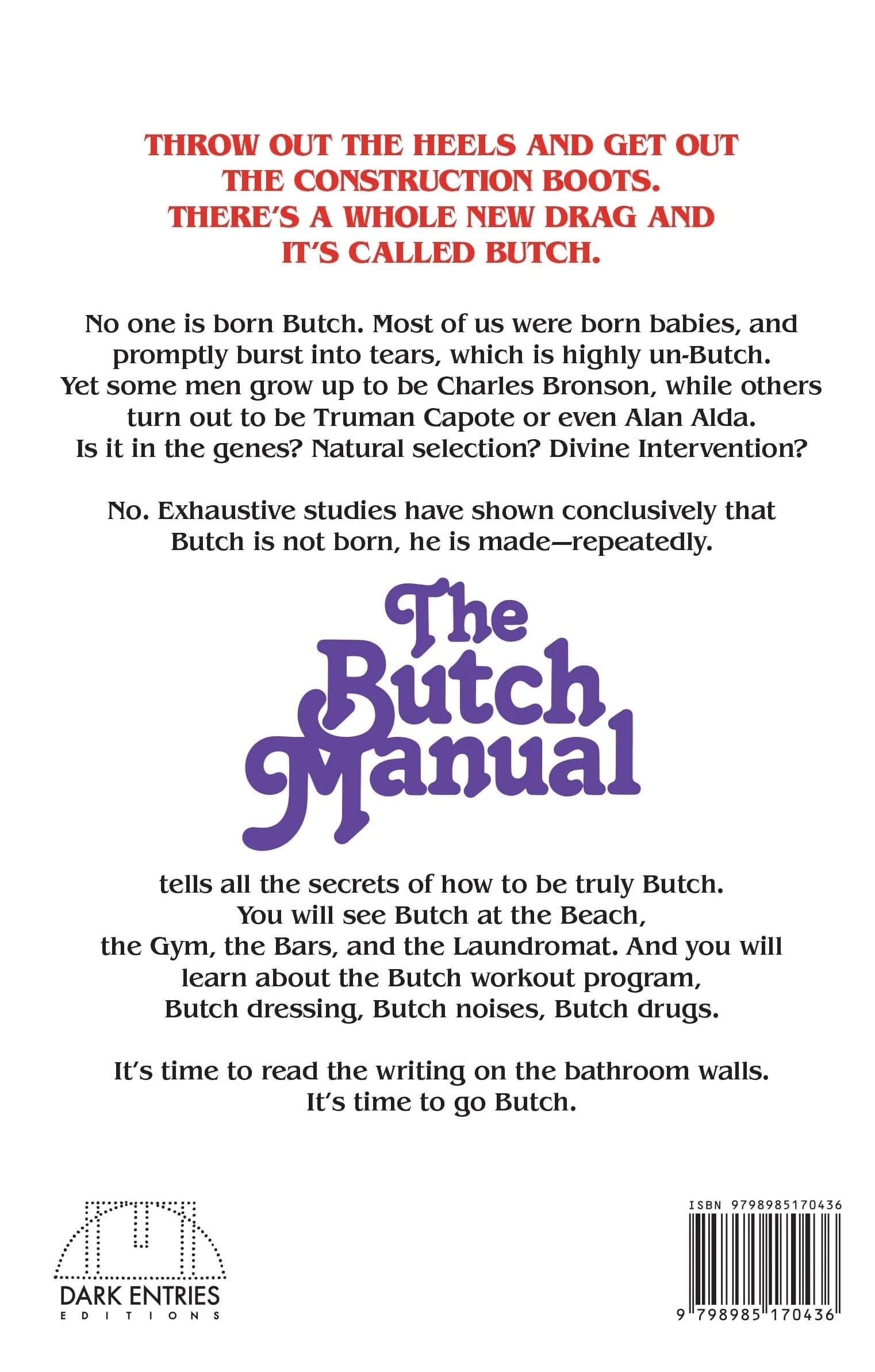
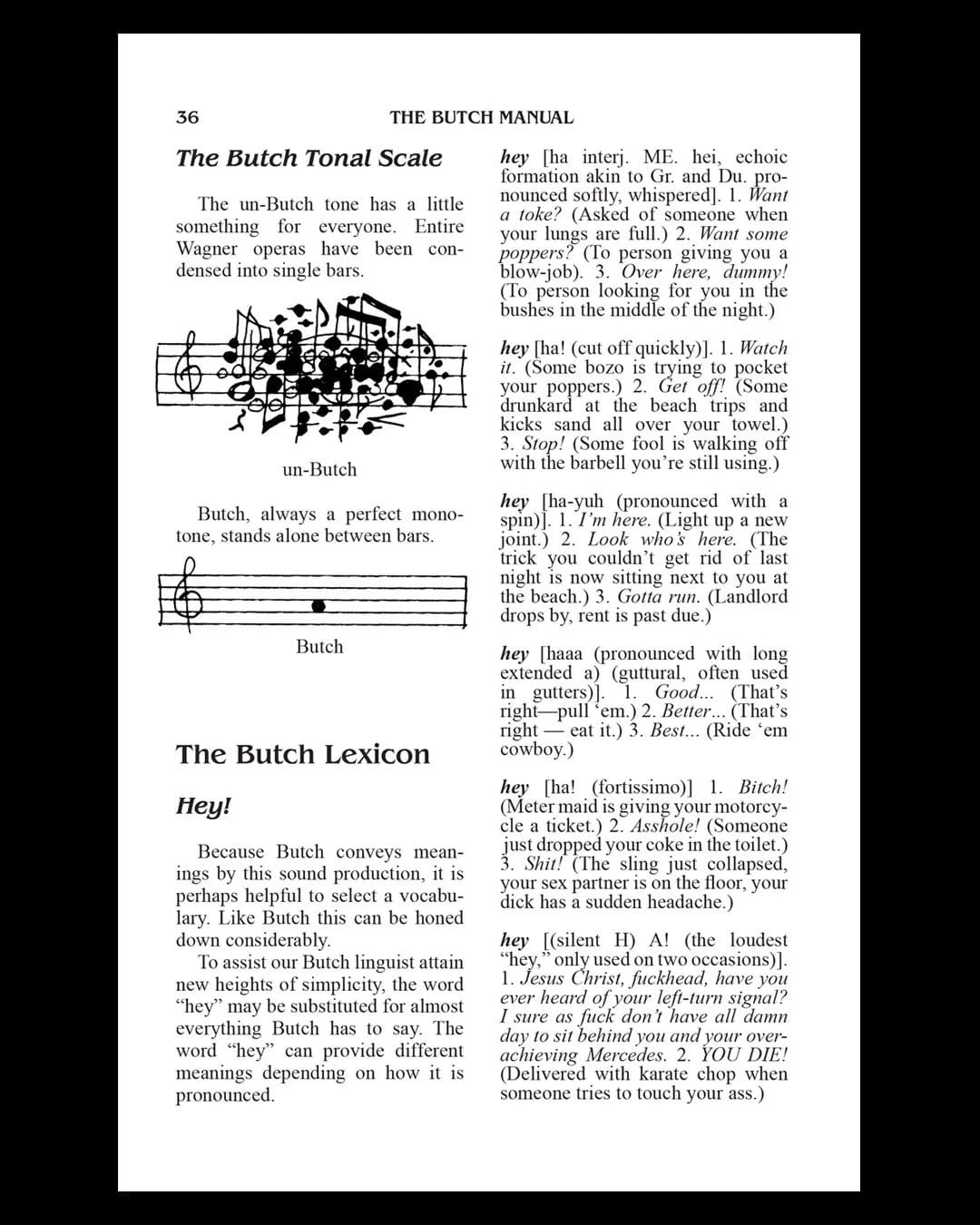
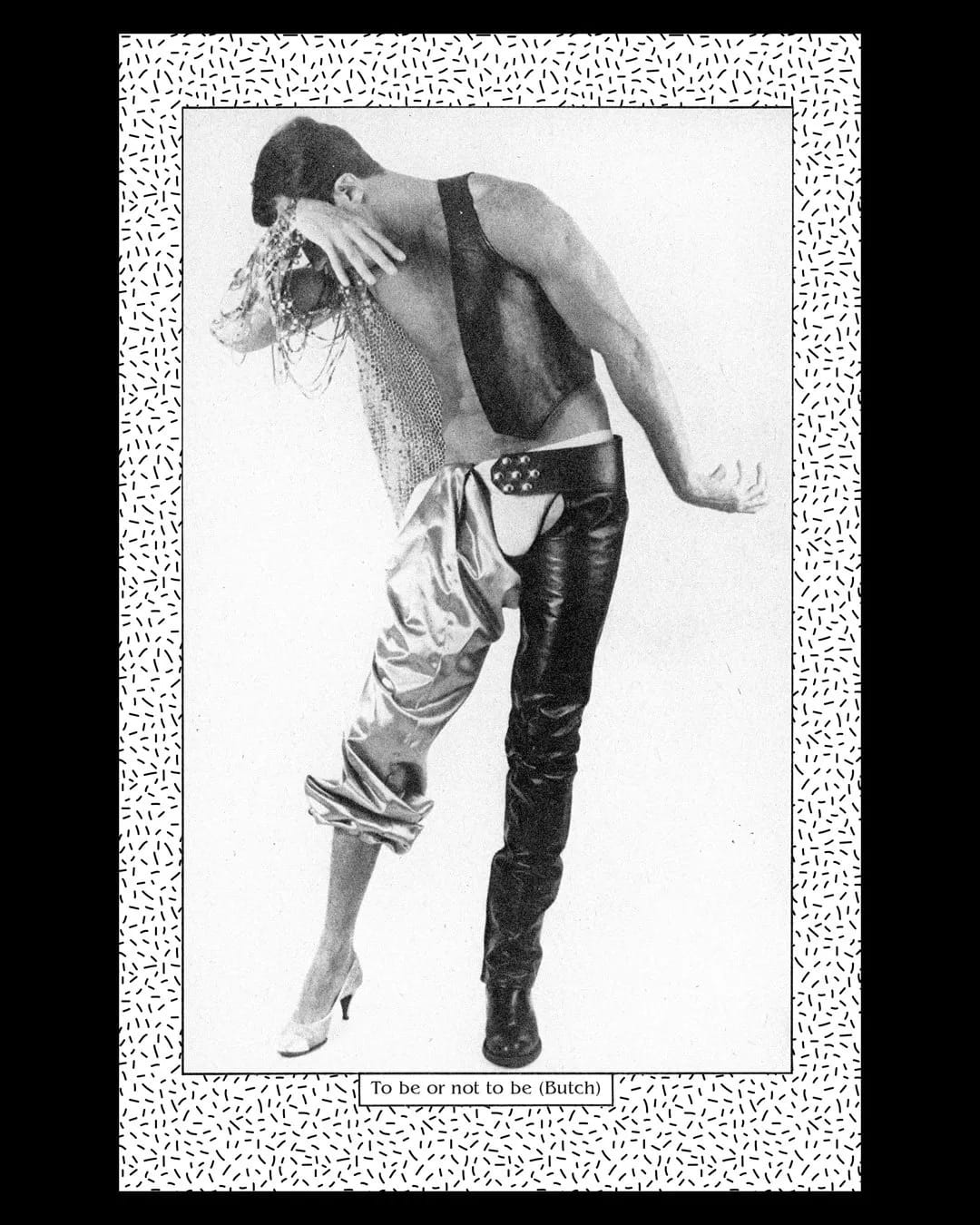
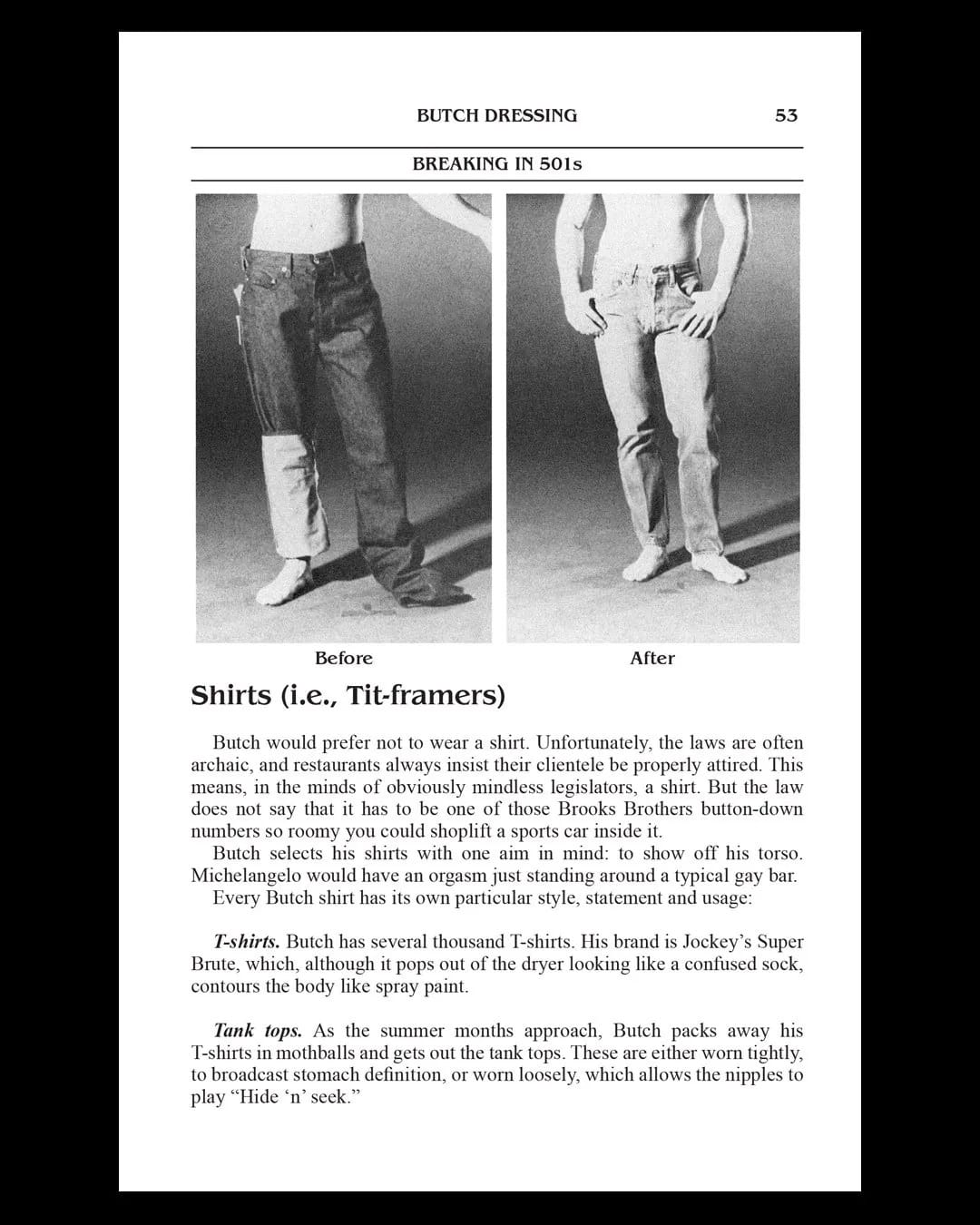
Excerpts from The Butch Manual (Dark Entries Editions)
XANDER'S POSTSCRIPT: Clark Henley died of AIDS in August 1988, slightly less than two months before I was born. He was 38. As I write this, I'm two months away from my 37th birthday. A brief obit of this "writer, artist, and friend" is stored online by the GLBT Historical Society.
